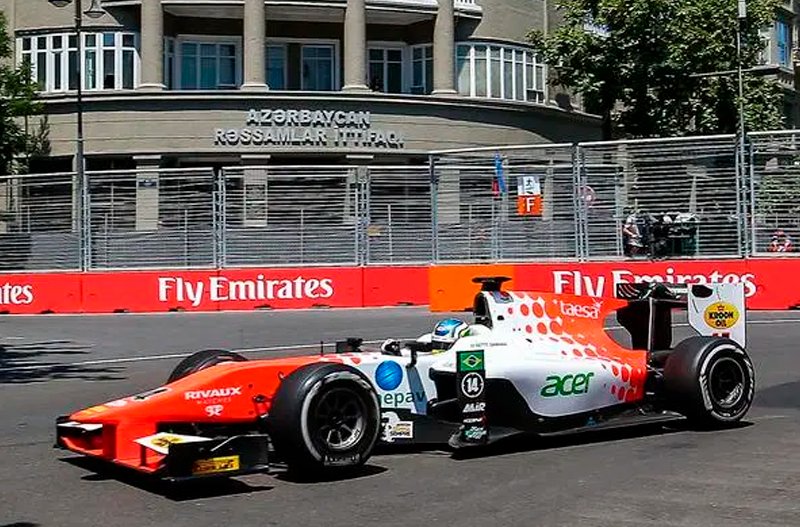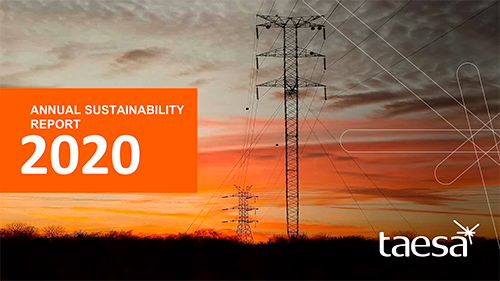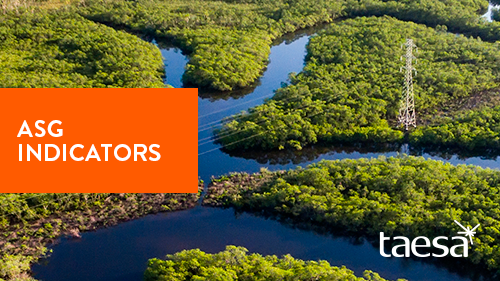Through its assets, Taesa is present in different biomes and contexts throughout Brazil, in both urban and rural areas. Following the concept of sustainable development, we seek growth that meets current needs without compromising the ability of future generations to meet their own needs. This means using natural resources efficiently and minimizing impacts when implementing new projects and/or maintaining concession assets and facilities, while promoting development and shared values with local communities.
People Management
Three material themes have a strong interface with People Management:
– Health, safety, and quality of life.
– People management and development.
– Ethics, transparency, and corporate integrity.
Taesa has People Management initiatives and regulations pertaining to Recruitment, Selection and Admission, Personnel Administration, Labor and Union Relations, Engagement, Benefits, Remuneration, Recognition and Meritocracy, Climate, Development, Performance and Succession, and Transition and Terminations, both within the company itself and its subsidiaries.
Employee development is crucial to Taesa’s business strategy and is fully integrated into its management model. Investing in employee development not only aims to meet the company’s current needs, but also ensures that the necessary skills are available in the future. This continuous investment results in professionals who are more qualified and better prepared to achieve the best possible results.
Furthermore, Taesa ensures equal opportunities, respect for diversity, and the possibility of building a solid career in an ethical and transparent manner for all its employees. The company offers competitive remuneration, attractive benefits, and a stimulating and challenging work environment. Taesa also promotes a culture of open, respectful, and transparent communication, facilitating the exchange of knowledge between its employees throughout the country.
Profile of professionals on 12/31/2024
 875
875
employees*
 689
689
men
 186
186
women
 875
875
employees*
 689
689
men
 186
186
women
In compliance with the Brazilian Equal Pay Law – No. 14.611 and Decree No. 11.795/2023, which provide for equal pay and remuneration criteria between men and women in the workplace, as well as reinforcing the transparency of this information to our stakeholders, we make available the Report on Transparency and Equal Pay for Women and Men released by the Ministry of Labor and Employment (MTE).
Such data were obtained through e-Social and the Salary Equality Declaration filled out on the Emprega Brasil Portal, referring to the year 2022 for the head office. You can access the report by clicking here.
 Attracting Talent
Attracting Talent
TAESA sees its employees as its greatest asset. Employee development and safety are key to their personal growth and the Company’s success. Thus TAESA invests highly in training and upskilling its workforce, looking to foster a dynamic and challenging work environment.
By recruiting top experts in the market who are passionate about their work and aligned with its values, TAESA offers the opportunity to make a positive impact on Brazil’s energy transmission industry. The recruitment process is governed by a code of ethical conduct and strongly committed to diversity, which makes it very transparent and ensures equal opportunities for all.
TAESA also adopts an internal recruitment policy which prioritizes its current employees before seeking external talent. This practice helps with talent retention and shows appreciation for human capital, in addition to providing career growth and development opportunities.
Candidates can access the opportunities and register their resume on this page.
 Recruitment and Selection
Recruitment and Selection
The People & Communication Management team oversees the recruitment and selection processes and, to that end, uses appropriate tools, instruments, and methodologies, working together with the other departments. This is key to ensure that both behavioral and technical requirements for the position are met according to the job structure in place.
Cultural alignment with TAESA is a key factor in Recruitment and Selection, along with a satisfactory contribution to Organizational Competencies. The process is very transparent and offers opportunities to any and all candidates who meet the position’s prerequisites.
 Qualification and Training
Qualification and Training
Employee development is a key aspect of the Company’s strategy and is an integral part of its management model. Continuous investment in development will result in high-skilled employees who are capable of creating, leading, and delivering the best results for the Company now and in the future. Likewise, the training provided to the external public aims to promote sustainability and generate income for individuals seeking further development.
To remain a reference in the transmission market, Taesa constantly strives for the best practices in the field of organizational development. Strategic partnerships with renowned institutions such as Ibmec, Instituto Capacitare, CIEE, SENAI, COPPETEC UFRJ, and Crescimentum ensure a competitive advantage in the qualification and development of professionals.
We offer various training modes and formats, emphasizing corporate training related to our five Organizational Competencies:
– Interpersonal relationship
– Responsible Excellence
– Independence and Accountability
– Strategic vision
– People Development (only for leaders)
Discover some of the company’s initiatives focused on developing its professionals:
– Education Incentive: In addition to encouraging the search for knowledge and training, the goal here is to assist in retaining these professionals, who can receive this benefit for the entire length of the requested course (be it technical, undergraduate, postgraduate, or a master’s degree), limited to five years. The company reimburses the employee 50% of their chosen program’s monthly fee.
– Performance Assessment Cycle: Every year, all Taesa employees, up to the Executive Management level, take part in the Performance Assessment Cycle. As part of its regular practice, Taesa carries out an annual review of its functional and organizational competencies, seeking to align them with the strategic growth organization chart and with the evolving complexity and responsibility of each role.
– Corporate Training: Based on our Organizational Skills, the results of the Annual Performance Assessment, and each department’s needs, Organizational Development defines topics to be covered in short-term training, focusing on behavioral aspects.
– Survey of Training Needs:These trainings are defined as a partnership between the People department and Taesa managers, based on gaps and opportunities for development for each employee, identified mainly in the performance evaluation. The goal is development based on our skills and values, always seeking to provide the best and most current training to bring best practices from the market and incorporate them into Taesa’s processes.
– Young Apprentice, Technical Internship, and Higher Education Internship Programs: TAESA, in partnership with respected institutions, is fully concerned with how employees enter the company, not only to develop them internally in the company’s skills, but to train them for the job market, because we understand the importance of being well prepared for the beginning of one’s career and professional and personal life.
– Successor Development Program: Every year, the successor program chooses a target audience, recommended by managers, to work on leadership and develop competencies through self-knowledge and training with internal tools and strategies.
– Leadership Development Program: In addition to a series of corporate training initiatives specifically customized for managers, in 2023 we began a successful partnership with COPPEAD, which, together with our Organizational Development Management, designed a training syllabus aimed at our Taesa Leaders.
– “Desapega” Program (Managers and Successors): “Desapega” is Taesa’s job rotation incentive program, focusing on leaders and employees who are formally identified as Successors.
– Internal Training: Training is provided internally with the aim of developing technical skills linked to the day-to-day work of employees. This training can take place in the form of classes, workshops, or distance education.
– Technical Training: These are training courses that have a longer workload and cover specific topics in our technical areas. The goal of the training is to guarantee a common baseline level of knowledge and standardize activities carried out in the field.
 Diversity and Inclusion
Diversity and Inclusion
TAESA’s top priority regarding diversity is to establish guidelines that promote respect and appreciation for differences—whether cultural, social, religious, ethnic, or otherwise. The company recognizes that diverse perspectives enhance problem-solving, drive innovation, increase engagement, and help to promote long-term sustainability and societal well-being.
TAESA’s principles and policies on diversity extend beyond its employees to include its suppliers. To uphold these values and ensure equal opportunity, the company has incorporated contractual clauses that reinforce these values in all its agreements. Any and all suppliers are preliminarily assessed on these aspects during the registration process, and if any non-compliance is identified after contracting, they may be subject to restrictions or suspension.
Since 2021, TAESA has supported a Diversity Program based on its ethical principles. This program has allowed for the development of internal policies, the creation of the Diversity & Inclusion Working Group, and the launch of many initiatives, including bi-monthly meetings with affinity groups across the program’s five pillars: People with Disabilities (“ PwD”), Prime Talent (50+), Ethnicity & Race, Women’s Empowerment, and LGBTQIAP+.
Find out more through the TAESA Diversity Booklet*:
Health and Safety
TAESA highlights the importance of Health, Environment, and Safety Management in all its asset deployment, operation, and maintenance activities. Adopting a preventive approach, the company seeks to protect everyone engaged in its activities, promoting safe and healthy work environments. As part of the implementation of TAESA’s Integrated Management System (“SGIT”), internal rules have been reviewed to ensure compliance with the guidelines established by ISO standards and other commitments made by the company.
The company highly appreciates employee input, from the design phase to the implementation of initiatives, since they allow for more accurate results. The Health and Safety team is constantly working to improve this process to make it more efficient and sustainable.
Health, Safety, and Quality of Life is considered one of the material topics and it reflected in the “100% Safety” Program. Launched in 2021, this program aims to strengthen the safety culture within the company by increasing the engagement of all employees.
The premises of the “100% Safety” Program include:
– Safety as a value for Taesa as a company and for each of its employees
– Engagement of our own and outsourced teams
– Equalization of the different safety cultures of contracted companies
– Monitoring processes and performing critical analysis of their results
– Identifying and implementing actions for improvement
The goals of the “100% Safety” Program include achieving zero accidents, improving project management performance, and adhering to industry standards for consolidated ESG reporting.
All TAESA employees are under the management of HES&S (Health, Environment, and Safety & Security), in compliance with the SGIT legal requirements. Environmental hazards and risks are identified and managed through the Risk Management Plan (“PGR”), Preliminary Risk Analysis (“APR”), and other regulatory protocols. TAESA employs a comprehensive Hazard and Risk Management methodology that applies to both direct employees and service providers. Contractors must comply with all legal requirements and submit their documentation for review and validation. TAESA is certified under ISO 9001, ISO 14001, ISO 45001, and ISO 55001 standards, which reinforces its commitment to regulatory compliance.
It uses digital platforms to manage Occupational Health and Safety processes, integrating with the SAP system and reporting to government authorities via e-Social. The Risk and Hazard Matrix and APR are used to assess activities, exposures, risks, and severity levels before any work begins.
TAESA has established a Workplace Health and Safety Committee to address operational issues. The company also maintains a CIPA+A committee at its headquarters and selected regional offices and holds weekly Safety Dialogues open to all employees. TAESA’s policies and manuals enforce the right to refuse work in cases of unsafe conditions.
TAESA provides a comprehensive health benefits package, which includes Medical Services and Health & Well-being initiatives through its “Living with Energy” quality-of-life program. This program, in collaboration with the Health Department, the Quality-of-Life Committee, and the Organizational Development Management team, includes:
– Workplace gymnastics classes
– Relaxation sessions
– Nutrition program
– Ergonomic awareness program
– Vaccination campaign
– And more
These initiatives aim to promote the health and well-being of employees and their dependents, demonstrating Taesa’s commitment to comprehensive care for its team.
TAESA’s Occupational Health Service oversees employee medical examinations through the Occupational Health Certificate (“ASO”), which considers job-specific risks based on the criteria set by NR7 and the Occupational Health Medical Control Program (“PCMSO”). The PCMSO management team establishes the program methodology and supervises all occupational health screenings.
Occupational risk assessments are conducted using the Homogeneous Exposure Group (“HEG”) methodology, which aligns job descriptions with most common risks, required medical exams, and expected training for each role. This approach helps to ensure compliance with compulsory health check-ups and training, and the proper periodicities.
In case of accidents, incidents, or near-misses, TAESA ensures immediate reporting and thorough investigations to identify any and all contributing factors, which allows for implementing corrective and preventive actions.
The company develops projects, actions, and initiatives to enhance safety performance, aiming to eliminate incidents and strengthen the safety culture among employees. Additionally, TAESA monitors and promotes safe and healthy environments for any and all suppliers, contractors, visitors, and other stakeholders.
Relationship with Stakeholders
To ensure sustainability, Taesa values transparency and maintains open channels for all interested parties to access the company. Below are the main audiences with which Taesa interacts and how this approach occurs:
Taesa is controlled by “Companhia Energética de Minas Gerais” (CEMIG) and “ISA Investimentos e Participações do Brasil SA” (ISA Investments).
Taesa has 63.45% of shares traded on the market. One of the company’s main goals is to maximize value for its shareholders, ensuring the long-term sustainability of the business, the provision of a high-quality essential service, and respect for the rules established by Brazilian regulatory authorities.
TAESA’s main communication channel it is the website (www.taesa.com.br/ri), in addition to the e-mail from the Investor Relations department (investor.relations@taesa.com.br) and the contact telephone number of the IR team (+55 21 2212-6000). Meetings of management bodies are also held (General Shareholders’ Meeting) and annual public meeting with analysts.
Taesa’s customer group is made up of electricity generators, free consumers, distributors (and their captive customers), and other transmitters, which connect with or share their facilities with the company.
To identify this audience, we employ the list of users provided every month by the ONS, in addition to our Sharing Contracts (CCI/CCT). The relationship is guided by our Quality Policy and our Code of Ethical Conduct and Compliance.
In general, communication is established directly between the parties, through Taesa’s email addresses or website. This allows quick and easy consultation of document histories for all Users of the National Interconnected System (SIN), facilitating understanding and answering questions related to transmitter billing.
Taesa’s primary vendors and suppliers include manufacturers of large electrical equipment, engineering companies, environmental consultants, auditors, office supply companies, travel and accommodation agencies, vehicles, freight, and insurance.
Our relationship with suppliers is constant, especially in contracts related to auctions, reinforcements, improvements, and other day-to-day operations.
Taesa establishes strict standards for registering and contracting suppliers, in order to make such processes transparent and auditable. We have developed standards for registering supplier profiles, bidding processes, and judging proposals. The basis supporting the company’s supply department is the SAP tool and our partner SERTRAS, an outsourced specialist company whose scope is to certify suppliers, which is available at the following llink below.
Our relationship with our teams is governed by our Human Resources Policy and our Code of Ethical Conduct and Compliance, in addition to compliance with labor legislation. A collective bargaining agreement covering 100% of employees and signed with the unions associated with the company (Sintraindistal, Sinergia, and Steet) covers topics such as salary adjustments, time bank, and Profit Sharing (PLR) and benefits packages. It is currently effective until May 31, 2024.
Our primary channels for communication and relationship include our corporate WhatsApp account, email addresses, intranet (Taesa Digital), electronic bulletin board, team and Board meetings, and monthly birthday celebrations, department newsletters, and promotion of corporate policies. The teams’ demands cover issues such as electronic timekeeping, vacations, proof of remuneration, and benefits package.
Every year, the company carries out an organizational climate survey in partnership with Great Place To Work (GPTW). In 2023 we reached 92 points and were certified as a “best company to work for.” Furthermore, we won first place in the Energy sector at GPTW for the third consecutive year, reflecting the engagement and sense of belonging of our employees.
Our communication with unions occurs via email, posts on our website, and correspondence, prioritizing collective bargaining agreements. With public entities, such as the Department of Labor, Brazilian Federal Revenue Service, and Social Security, our communication occurs through the eSocial and e-CAC systems, as well as specific websites and correspondence, aiming to comply with labor and tax obligations.
Taesa recognizes the crucial role of the press as a link between the company and society, providing access to accurate and reliable information. To ensure effective communication, we constantly monitor any news published about our activities and assets, and we promptly respond to requests from the media when necessary.
The Taesa website has a section dedicated to the Press Office’s telephone and email contact channels, facilitating access for interested parties to relevant information about the company. This initiative demonstrates Taesa’s commitment to providing transparency and being available to provide clarifications and answer questions from the press and the general public.
The public entities with which Taesa most frequently interacts are: the Brazilian Electric Energy Agency (ANEEL), the Ministry of Mines and Energy (MME), the Brazilian Institute of the Environment and Renewable Natural Resources (IBAMA), as well as state and municipal environmental agencies, the National System Operator (ONS), and others.
We classify as Stakeholders all those who have the power to supervise the electric energy transmission service in general and the purview to issue procedures, resolutions, standards, or regulatory laws, and develop public policies for the electric energy sector.
Our relationship with these public entities occurs differently with each one, through various means:
- With ANEEL: Sending information and correspondence regarding issued directives and corporate accounting information, requests for consent in specific business processes, involvement in meetings and public hearings promoted by the Agency, and participation in auctions for new transmission lines.
- With MME: Sending and monitoring correspondence, and meetings, when appropriate.
- With environmental agencies: Compliance with their obligations regarding environmental programs, technical meetings, when appropriate, and answering questions.
- With ONS: Exchanging correspondence and technical information, technical meetings, when appropriate, and participation in its Board of Directors.
Taesa recognizes the importance of dialog with social and environmental organizations and communities from the initial prospecting phase of energy transmission projects. This relationship is established in several stages, from preliminary studies carried out by the Energy Research Company (EPE) to environmental licensing processes.
During the licensing process, socio-environmental studies are conducted to identify the communities affected by each project, as well as interested social and environmental organizations. The main issues raised during these dialogues involve aspects such as safe coexistence with the lines, use of the easement tracks, environmental impacts and compensations, and possible partnerships and support for socio-environmental projects.
Taesa’s stakeholder relationship policy is guided by its Code of Ethical Conduct and Compliance, as well as by concession contracts and current legislation. To facilitate contact and communication with the company, Taesa’s institutional website provides a specific page with information about our projects, as well as forms and telephone numbers for asking questions and making complaints, including a telephone support line.
With regard to Research, Development, and Innovation (RD&I) programs, socio-cultural and sports projects, and sustainability actions, our relationship occurs through our website or directly with the Taesa department in charge of said initiative. During the operational phase, Taesa maintains active communication channels, such as the Environmental Education Program (PEA) and the Social Communication Program (PCS), developed throughout our concessions. These initiatives aim to promote a transparent and constructive dialogue with interested parties, contributing to a relationship of trust and cooperation.
Local Development
Taesa recognizes that business success goes beyond economic and operational indicators, and prioritizes economic development integrated with quality of life, health, and social justice. To achieve this goal, we promote an equitable environment where everyone can enjoy a high level of well-being, including increased real income, improvements in health and education, fair distribution of resources, and guarantees of basic freedoms. This approach is aligned with our material topics of Ethics, Transparency, Corporate Integrity, and Relationship with Local Communities.
To strengthen our relationship with interested parties, we carry out comprehensive diagnostics of socio-environmental issues and seeks to engage with and consult stakeholders to identify opportunities and possible impacts. This practice is integrated into the environmental licensing, feasibility analysis, and project operation processes.
During each project’s implementation stage, we are concerned about the entire context that a new installation could cause in the affected communities, from expectations regarding the creation of jobs and increases in income to what it will be like to coexist with the new structures. We carry out actions to minimize our impact on the environment, such as by optimizing routes to avoid interference in sensitive areas. Here, our socio-environmental programs aim to provide quality information about the works and other programs that will take place during this phase.
During the operation stage of our projects, our technical teams carry out regular inspections of the lines and structures of the concessions, staying in close contact with the neighboring stakeholders to identify demands and ensure safe coexistence with our facilities. We run programs such as the Environmental Education Program (PEA) and Social Communication Program (PCS), where we develop specific actions, such as training to combat small fires and preserve the environment.
Among the company’s relationship actions, other highlights include our dedication to social responsibility projects, including cultural, sports, and health initiatives. We also prioritize partnerships with local institutions to develop workforce and regional suppliers. We regularly assess the level of satisfaction of nearby communities through opinion polls, ensuring that Taesa’s actions are aligned with their needs and expectations.
 Social Responsibility Projects
Social Responsibility Projects
Taesa best optimizes the application of resources assigned to Social Responsibility Projects, focusing on sustainable initiatives that promote civic integration, inclusion, and social development. Carrying out educational and cultural projects in communities close to our operations not only adds value to shareholders and employees, but also strengthens society as a whole.
The projects mentioned below were supported in 2023 via Tax Incentive Laws. Link
SPORTS INCENTIVE LAW
The 5th Edition of the “Sport Education” project aims to promote the social integration and development of children and adolescents in Assis (SP) through sports and socio-educational activities.
In Belo Horizonte (MG), the “Future Generation” project aims for structural adaptation and the hiring of staff to offer cultural, educational, and environmental activities for 2,000 children and adolescents.
“Changing the Game,” located in Marabá (PA), offers access to sports in modalities such as Karate, Jiu-Jitsu, Swimming, Futsal, and Volleyball, in addition to professional training courses for more than 375 children and teenagers.
ELDERLY LAW
“Good Living in the Agreste,” located in the Northern Agreste of Pernambuco, aims to promote hands-on and educational actions to support agroecological agriculture, with an emphasis on civic education, community involvement, and valuing aging in a positive and healthy way.
 Suppliers
Suppliers
Taesa is constantly strengthening its relationships and interactions with interested parties. The Engineering and SMS&S areas collaborate in technical cooperation processes to validate suppliers’ capabilities and guarantee the safety of purchased services and materials. This approach aims to mitigate possible risks during the execution of our projects.
Taesa’s Materials and Services Acquisition standard establishes guidelines for the acquisition of materials and services, with the following goals:
– Promoting transparency, equality, control, and compliance in the process
– Optimizing the acquisition process, seeking the best balance between cost, quality and time
– Ensuring the quality of our supplier base in accordance with the regulations of the competent bodies
Taesa’s purchasing process involves sensitive information from suppliers, such as price and technical solutions, and can be centralized or decentralized, with the participation of employees from different areas. It is essential that everyone involved adheres to the Code of Ethics and Compliance, in addition to other company policies, acting with transparency, equality and responsibility in the treatment of information.
Taesa carries out audits on our main contracts to analyze aspects related to good compliance practices, in addition to inspections carried out by SMS&S and environmental technicians in the field.
Safety is a fundamental value for Taesa, so during the contracting process, the topic can be used as a tie-breaking criterion between the proposals presented. Furthermore, Taesa emphasizes the importance of its suppliers respecting Human Rights, and will not tolerate any form of exploitation of adult or child labor. This aspect receives special attention during the hiring process.
To ensure compliance with contractual requirements, Taesa relies on the support of third-party companies specialized in supplier certification. After opening the bidding process, these companies carry out a comprehensive analysis of participants’ labor, social security, tax, and social issues, generating a risk score. Aspects such as the use of forced or mandatory labor are also taken into consideration by the consultancy. Furthermore, the Compliance department carries out background checks to analyze suppliers.
Taesa’s commitment to ethics and compliance is firmly established in our Code of Ethics. As a signatory to the United Nations Global Compact, we include a clause in our contracts whereby our contractors undertake to respect Human Rights and not to use child or slave labor. Furthermore, our contractors are contractually obligated to provide adequate conditions for its employees, including accommodations, chemical bathrooms, ambulances, and other necessary resources.










